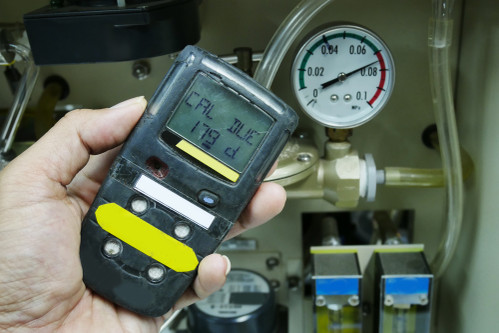Which Gas Detection Device is Right for Your Workplace?

Choosing a gas monitor or detection device depends on the nature of your workplace and how your employees interact with the space. Learn about the pros and cons of different types of gas monitors to make the right choice for your business.
Three Types of Gas Detectors:
- Portable gas detectors
- Fixed gas detectors
- Gas detection tubes (Colorimetric detection devices)
- Portable gas monitors are designed for employees working in the field or on location.
- Ideal for first responders, maintenance and utility workers that work in a range of hazardous environments.
- Often clipped to the person’s collar, lapel, or bag, keeping their hands free on the job. Should be worn near the “breathing zone” for most accurate readings.
- Will emit an audible, vibrating, flashing alarm when toxic gases are present, so the person will see, hear, and feel the warning. Ideal for noisy areas or those with low visibility.
- Battery operated to be worn or carried easily.
- Fixed gas detectors are designed for continuous monitoring of the workplace.
- Ideal for keeping track of known potential hazards within the same space on an ongoing basis.
- Often mounted to the wall or ceiling.
- Will emit an audible, flashing alarm when toxic gases are present.
- Requires installation and regular maintenance.
- Low cost and easy to use.
- Provides qualitative results for periodic spot testing.
- Ideal for brief, short-term measurements, with tube choices covering a wide variety of gases.
- Uses a color-coded system for near-instant results.
- Able to measure gases for which there are no electronic sensors available.
Single vs. Multi-Gas Monitors
- Single-gas monitors detect just one hazardous gas at a time such as hydrogen sulfide or chlorine gas.
- Multi-gas monitors have more than one sensor to detect a range of gases at the same time, such as oxygen (O2), hydrogen sulfide (H2S), carbon monoxide (CO), and the Lower Explosive Levels (LEL) of a variety of combustible gases.
Gas Detectors vs. Gas Monitors
While many use these terms interchangeably, they can have nuanced differences.
Gas Detectors
- Gas detectors are portable units designed to alert the user to hazardous gases.
- Typically used by workers as they interact with their workplace
Gas Monitors
- Gas monitors may be self-contained devices or integrated into a network of similar devices.
- They may be placed in various rooms, hallways, and other high-traffic areas.
- They maintain surveillance of a room or space over time.
Speak with the safety experts at PK Safety at 800-829-9580 to find the right gas monitor or detection device for your business.
Sep 30th 2020
Recent Posts
-
Customizing Gas Detectors: Tailoring Solutions to Fit Your Unique Requirements
In today’s diverse industrial landscape, a one-size-fits-all approach to safety simply doesn’t cu …Jul 3rd 2024 -
10 Ways to Prevent Wildfires
You can prevent wildfires by extinguishing flames before you leave the worksite. Avoid practicing …Jul 1st 2024 -
ANSI/ISEA 138 Safety Gloves: Ensuring Hand Protection
The human hand is an anatomical masterpiece and arguably the greatest tool attached to our bodies …Jun 25th 2024





